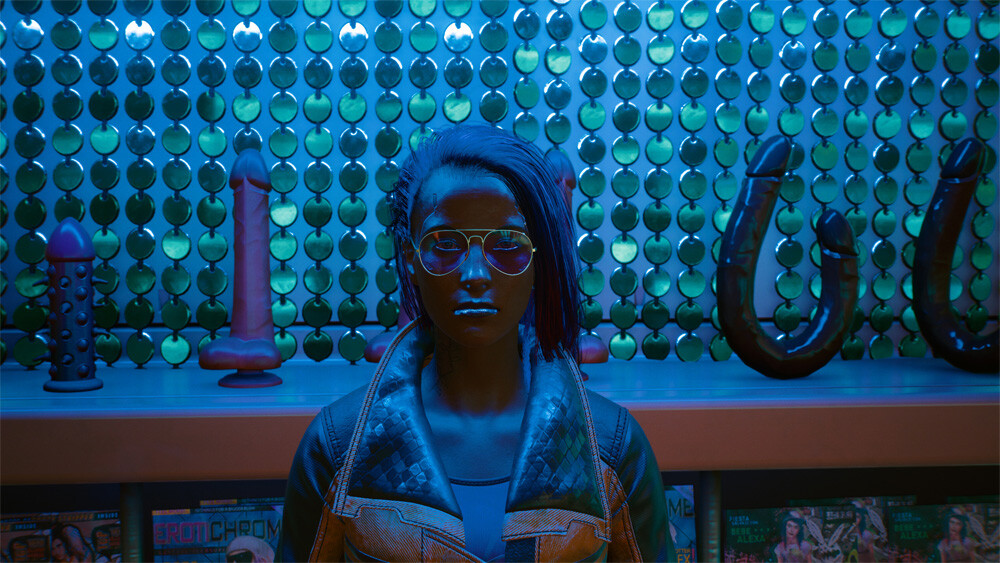The 'Metaverse' Shows Why Making Good Cyberpunk's So Hard Now

Microsoft and Disney recently announced their intention to compete with Facebook for control of the, ugh, Metaverse, the virtual reality reincarnation of Second Life that Mark Zuckerberg is trying to create with his Z-tier acting chops …
… and technology that doesn't exist yet. And, in other news I consider equally important, the scandal-riddled Cyberpunk 2077 is still disappointing players a year after its release.
Don't Miss
One of the many criticisms of Cyberpunk is that it largely lacked the social commentary once common to the genre. The future it shows you is generically bad, but you're a cool dude who can shoot his way to fame and fortune, so just ignore the problems and enjoy all the pretty lights. It was an aesthetic without serious ideas, only "grit" as imagined by 15-year-olds who think throwing cyber-dildos everywhere constitutes worldbuilding.

CD Projekt RED
The cyberpunk genre still produces interesting work (like the game Neo Cab), and there's always been shlock that cruised by on imagery. But it feels like the big names have given up. The Matrix Resurrections, the sequel to a movie about a man awakening to the fact that there's more to his life than grinding out a corporate job, is encouraging fans to drop $50 on 100,000 NFTs, otherwise known as JPEGs that can be used as Twitter avatars if you want to advertise the fact that both your priorities and your tastes are bad. Warner calls it "a truly unique way to engage with the content."
The future cyberpunk posited is turning out just as intrusive as predicted, but also much, much lamer. Sure, we've got the rampant wealth inequality and nonstop data surveillance, but our technocratic overlords can't think of anything better to do with their power than make trucks uglier and meetings more annoying. Microsoft's big plan for the, God help us, Metaverse is to let people use animated avatars on video calls. Finally, employees can be asked to work overtime by a boss presenting himself as some Caillou-looking jackass.

In cyberpunk, the digital worlds of the future are at least useful and interesting, even if the real worlds they're contained in are falling apart. But instead of samurai hackers, in reality, we have guys named Chaz trying to corner the market on links to pictures of hideous cartoon monkeys, and while that admittedly makes it safer to walk down the street, it's also difficult to satirize people who would cut their own dicks off for money if they were told the severed dong market was booming.
The Metaverse's intended purpose appears to be to make work more annoying; to ask why you would just send an email or have a quick phone call when you and your colleagues could strap on a VR headset and make your corporate cartoon avatars perform an elaborate song and dance. They're working from "How can we make the world more futurey?" instead of "What can the future make for the world?"
The precise meta-products we'll be meta-getting remain to be meta-seen because the hype is wildly outpacing the technical reality, but Facebook and Microsoft seem either ignorant of (or completely uninterested in) the fact that people have lives outside of work. How do you mock that? Cyberpunk envisioned a future where corporations lock up their employees in gilded cages, but at least the fictional megacorps don't stoop to making their salarymen enter an obnoxious virtual meeting space for the quarterly budget meeting.
"Imagine an incredible future where, instead of visiting a bland Accenture office, you visit a bland Accenture office!" is not the selling point they seem to think it is.
The Metaverse, a word I'm already so tired of typing, has been called the second coming of Second Life, but if that's the case, then its creators fundamentally misunderstand both why Second Life failed to live up to the hype and why it still continues to chug along for a niche audience today. When Second Life launched, it was flooded by corporate clients who soon abandoned the space, either because they were only interested in garnering easy PR or because Nike realized that people looking at digital shoes while furries had an orgy in the background didn't translate to a lot of sales.
The only people who still use Second Life are people who can have fun with it, who are willing to jump through its hoops for the sake of their own entertainment. Nike is one of many companies supposedly "preparing" for the Metaverse, but what is there to prepare for? Who wants to learn more about whatever the hell "Cryptokicks" are? (Even dudes in black Air Force 1s aren't shady enough for those.) What is the point of occupying this virtual space if that space is so joyless? Zuckerberg's Metaverse demo, his grand vision for the future of technology, showed us a world less interesting than your dentist's waiting room.

I think we've largely surrendered to the sheer inanity of the reality that Silicon Valley has built since we accept its convenience as a trade-off for its evil and stupidity. Also because, if capitalism has a superpower, it's the ability to absorb and subsume all criticism like a wealthy gelatinous cube. Release a show like Squid Game, about how disparity and debt can dehumanize and kill us, and a month later, the internet will be blanketed with ads for overpriced Halloween costumes ripped from it. Cyberpunk 2077, a supposed tribute to the genre that despaired for our future, was pushed out the door after months of brutal crunch and tie-in offers for $500 chairs. The cyberpunk genre was just another bump in the road the cube's devouring.
But the Metaverse, a word we hopefully won't see again today, isn't even pretending to be convenient. It won't deliver anything to you faster and cheaper, and it doesn't appear destined to help you engage with your friends and family in a meaningful way. It's just lame, a confession from Facebook and Microsoft that they want more control over your life but can't envision a way to make that control compelling. Like Cyberpunk 2077, it's aesthetic without ideas.
Facebook can barely be bothered to explain their vision for the future beyond their hope that it involves a lot of people buying their $400 headsets while they figure it out. The closest they have to an ad that offers more than "Look, vague computer magic" is a video that shows two men having fun playing VR games together without realizing they're neighbors who dislike each other in reality.
Pushing addictive online relationships at the expense of your real ones is arguably everything wrong with the internet that Facebook helped build, and it also doesn't show much imagination beyond "What if everyone in Ready Player One was trash?"
Ready Player One is a good touchstone, actually, because its hero surrendered to their awful real-world conditions. While a lot of cyberpunk is about people on the margins scraping out a living in an oppressive system, games like Cyberpunk 2077 give us a fantasy about being badass enough to shoot people for a living instead of having to go to virtual staff meetings where the HR guy is dressed as an elephant. Because that's the fantasy that's easiest to sell, the fantasy of being lucky enough to rise above our problems instead of finding ways to fix them. Our own reality is missing the punk part of cyberpunk, and even the aesthetics aren't as cool as fiction promised us. But at least I can buy a $65 cyberpunk shower curtain.
Tech journalists have argued that we've already seen successful Metaverses that happen to be in Minecraft and Roblox, which both sport tens of millions of users. They're decentralized, immersive, encourage creativity, and have their own economies. They're also fun, but Facebook and Microsoft want to skip that step and jump straight to the part where they somehow make big piles of money.

—actual selling point in Facebook's presentation
Meanwhile, tech bros are busy writing Metaverse fanfiction (I'm so sorry we had to see that horrible word again), arguing that it "will turn your physical goods into more efficient financial assets," that receiving a Nike NFT when you buy real shoes will somehow translate into riches. Putting aside the fact that there's a streak of sociopathy in envisioning everything in existence as a means to make more money, it's telling that the arguments being made for the Metaverse are "What if we could work more while profiting from increasingly ephemeral concepts?" without pausing to ask if doing so would be a good idea.
And that's the tension we're going to be stuck with. Should the future be fun and interesting, or should it be full of obnoxious walled gardens that revolve around work and profit? Whatever direction we go, it's somehow become more cyberpunk to build a Minecraft statue of Mark Zuckerberg screwing a goat than it is to actually play mainstream cyberpunk games. Big-budget cyberpunk can't or won't rip into how dumb this all is, and, with apologies to those of you who bought the $250 Cyberpunk 2077 tie-in watch, I don't think that's changing soon.
Mark is on Twitter and wrote a book.
Top image: Meta